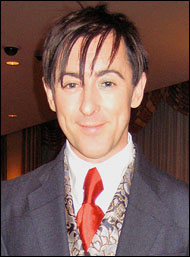
*
If you wanted to experience, live, the full breadth of the American popular songwriting tradition, you could attend the New York theatre for a decade or so, and, if you're lucky, you'd see examples of the artistry of late composing giants like Richard Rodgers, established living composers such as Alan Menken, rising theatre songwriters like Stew, artists who bridge the worlds of show tunes and jazz like John Pizzarelli, Paulo Szot and other opera stars who moonlight on Broadway, and contemporary Broadway musical theatre stars of the caliber of Sutton Foster, Victoria Clark and Alan Cumming.
Or you could take in just one season of Lincoln Center's American Songbook series.
All of the above artists will be part of American Songbook's 11th season, which begins Jan. 14, 2009, with the concert Night & Day: Rob Fisher Celebrates Cole Porter. The line-up has the usual kaleidoscopic musical focus the series prides itself on. Paulo Szot, a sudden musical theatre star since his enchanted turn in Lincoln Center Theater's revival of South Pacific, is expected to sing songs from his native Brazil. Singer Kurt Elling will pay tribute to the song stylings of mid-20th-century jazz singer Johnny Hartman, and jazz guitarist and singer Pizzarelli will devote his concert to the work of composer Richard Rodgers. And Nico Muhly, a 23-year-old Icelandic wunderkind composer who has commissions from the Paris Ballet and the Metropolitan Opera, will air a wide variety of his compositions.
"One of our chief anguishes over here is finding the right balance," said Jon Nakagawa, director of contemporary programming for the series, who, with Charles Cermele, producer of contemporary programming, puts together the series every year. "We look at American song as a form of storytelling," explained Cermele. "The stories are lyric-based. It's not an instrumental series. We look to artists who use music as a way to support the lyrics. It always goes back to the words."
And yet, there are a dozen other issues the two men juggle when mapping out a season. Among them: the nature of the performance space; the needs and expectations of the audience; what artists are currently prominent in the musical scene, and which exciting new artists have suddenly commanded attention. They also try to address and include the worlds of country music, opera, jazz, theatre and classical music as the affect the past, present and future of American songwriting.
Past seasons have featured such very different talents as eclectic songwriter Stephin Merritt, rapper Mos Def, opera star Deborah Voigt, Hollywood songwriting team Alan and Marilyn Bergman, and stage star Betty Buckley. One constant every year — beside variety, that is — is the series' dedication to the classic wordsmiths of American song, the Gershwins and Berlins and Cohans of history. "We always focus on the foundations of the series," said Cermele, "paying tribute to great songwriters of mid 20th-century."
By "foundations," Cermele means American Songbook's early years, when the series was curated by disc jockey Jonathan Schwartz, who is known for his love of the standards. When Schwartz left in 2001, and Nakagawa took over, the program's vision began to expand. American Songbook sponsored Stew's first New York concert and the cabaret debut of Sutton Foster. In recent years, the two men have introduced a country music component, inviting Roseanne Cash and Patty Loveless, who will perform in the coming season.
 |
||
| Alan Cumming |
||
| photo by Aubrey Reuben |
Some personalities are seasonal regulars, like John Pizzarelli and his cabaret singer wife, Jessica Molaskey. "Audra McDonald is the poster girl for American Songbook," joked Nakagawa. "She's a good example of what we're trying to accomplish. His musical tastes are very eclectic."
Nakagawa and Cermele say that, while they make themselves available to any artists seeking advice, they do not try to greatly influence the resulting concerts or songlists. "We choose not to,” said Cermele. “We're a little hands-off. When you see shows like this, very often the choice of songs, how they're put into order, can be as expressive as anything."
Besides, he added, "Some people, like Ute Lemper, are uncontrollable — in a good way."
American Songbook has no subscriber base and, not surprisingly, the make-up of the audience changes from concert to concert.
"There are a few loyal people who are true believers in what we are trying to do," notes Nakagawa. "They come to every single concert in order to experience the breadth and depth of American song."
"And they openly admit they don't like everything," added Cermele, "but they want to be supportive of it, they appreciate it. There can be high quality in various different forms, be it hip hop or a bluegrass fiddle virtuoso. The quality level is what goes through everything."










